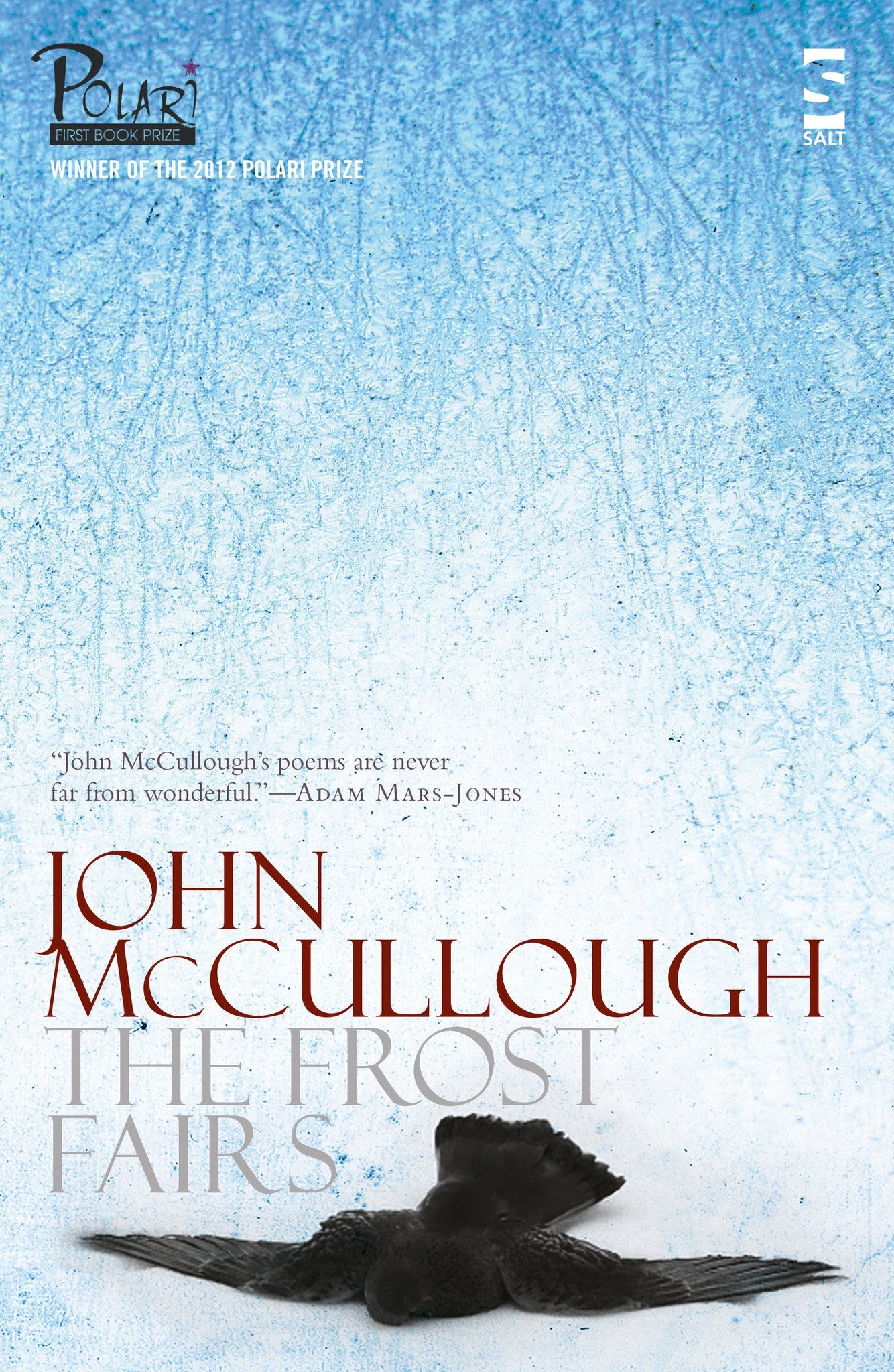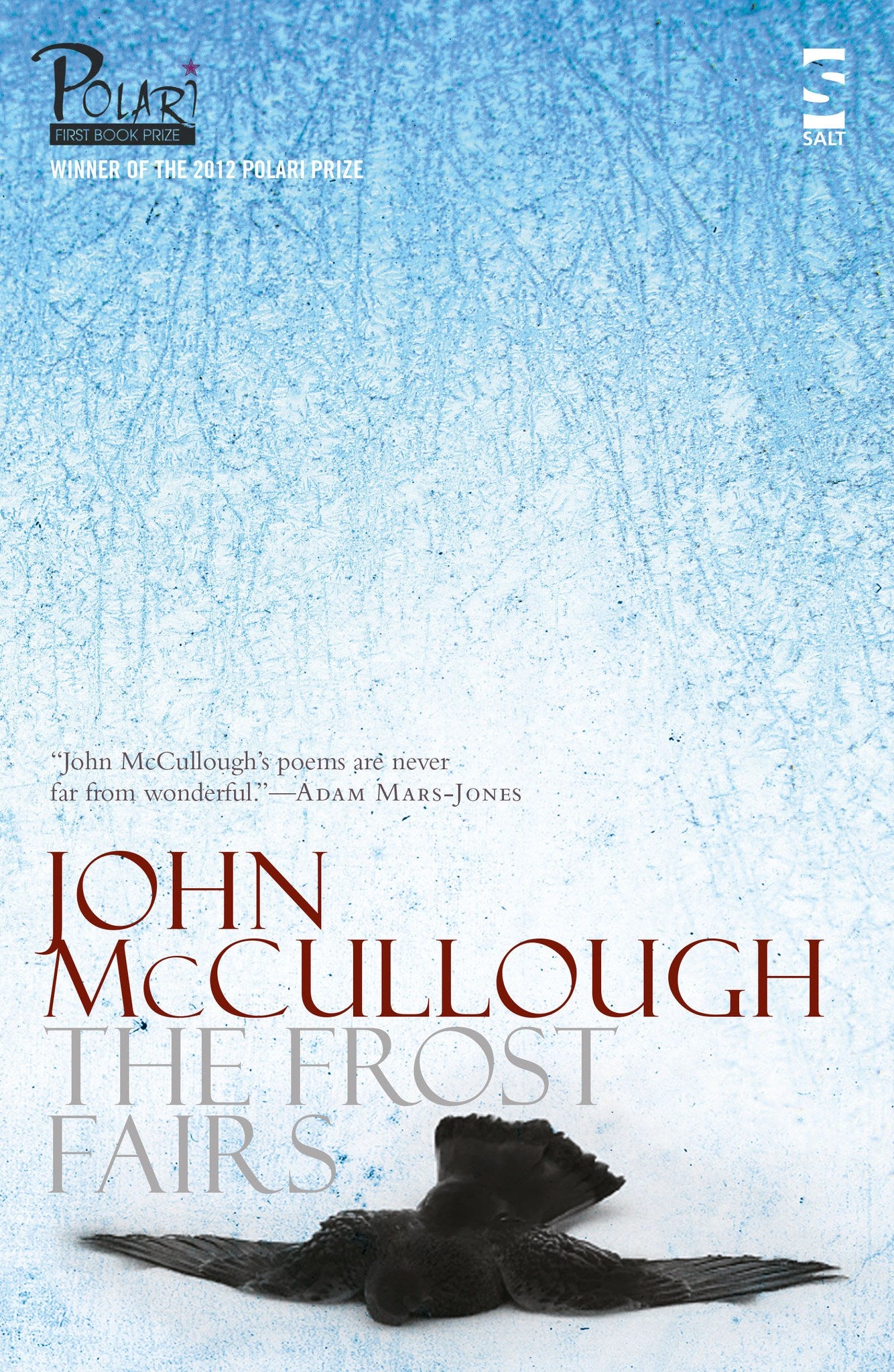John McCullough
The Frost Fairs
The Frost Fairs
SKU:9781844713981
Couldn't load pickup availability
Synopsis
Winner of the 2012 Polari Prize
A Book of the Year for The Independent and The Poetry School
Holiday Read in The Observer
The Frost Fairs is a compassionate book with a global and historical scope, tackling science and city life from a range of surreal yet poignant angles. It explores love in many forms, from modern transatlantic relationships to hidden gay and cross-gendered lives from the past. The pieces travel from ancient Alexandria to twenty-first century bars and council estates, behind everything the vastness of the sea and sky. The array of voices here is striking: taxi drivers report their most outlandish fares and hermaphrodite statues flirt with observers; abandoned lovers watch frost fairs melting on the Thames and drag queens revel in the freedoms afforded by the Blitz.
Formally deft and carefully crafted, this diverse range of poems uses language that is always musical and alive. Surprise and the uncanny are cherished as ways of returning to us the strange leaps and enduring power of our deepest yearnings. In this collection, longing and losing condition all we see and hear, making the impossible suddenly plausible. Whether exploring Brighton seascapes or questions of empire, there is always in McCullough’s writing an openness to seeing the world from an alternative point of view. At once bold and haunting, The Frost Fairs opens the door to a new country in the reader’s imagination in its exploration of the possibilities of the human heart.
Praise for this Book
‘In this immensely enjoyable collection there is an immediacy and tenderness that is outstanding. These vivid moving poems have such a sharp eye for those telling daily details, the particulars. All of this, plus their humour, creates poems that are so solidly tangible and believable. The title The Frost Fairs tells it all. The vulnerability and changeableness that threads our lives, the shifting ice below our feet.’ —Lee Harwood
‘John McCullough's poems are never far from wonderful. He shows a lovely mixture of ease and energy, so that there's a feeling of improvisation even in closed forms. Unpredictable, tender, resourceful – why shouldn't Wallace Stevens hold hands with Tintin?’ —Adam Mars-Jones
‘I’ve been reading John McCullough’s poems for several years and never saw him as “promising,” rather, as a verbal magician who had already performed, with a sureness and brio anyone might envy. The startling range of subjects can be partly accounted for by his ability to enter the imaginations of personae from odd walks of life or curious moments in history. He is even able to work out what Michel Foucault’s spoons might have thought about their owner! In poem after poem one senses the encroachment of an exalted vision held at bay by this poet’s commitment to conversational tone and offhand irony. I don’t want to round up the usual superlatives, but I do urge you to read this landmark first volume.’ —Alfred Corn
‘John McCullough is a poet for whom language is a flexible gift. He can be formal and controlled, colloquial and intimate, sensuous and saucy. He enjoys risk-taking in his work, forging unusual juxtapositions of images and ideas, and it’s this playfulness and humour which makes his work, like a stiff sea breeze suddenly hitting you in the face, so refreshing and invigorating.’ —Catherine Smith
Reviews of this Book
‘John McCullough's debut collection introduces a writer acutely aware of poetry's transformative power, its ability to question assumptions and subtly shift perspective ... Sharp yet compassionate, formal yet nimble, the poems glitter with slang and modern culture while maintaining an engaging seriousness.’ —Ben Wilkinson
‘[T]he sheer heart-stopping quality of the better poems, however, which make this collection such a rewarding and moving debut.’ —A.B. Jackson
‘McCullough has a very distinctive style of voice, creating a close affinity with the reader which builds to a wonderful empathy with the voices in this collection. A remarkable debut, he offers a playful, yet serious set of poetry which is full of nothing other than sincerity.’ —Liam Parkin
‘John McCullough is a delight to read, the poems sit there waiting for you to look at them again ... He’s an origami poet and the pages turn from horses to white capped waves to Sargasso seas to bathetic abyss and back ... It’s a lovely journey to take with a master of his art and I’d recommend this first compilation as an excellent gift for anyone with an interest in contemporary poetry, poetry that explores the LGBT experience of love and intimacy and anyone who likes a damn good read.’ —Eric Page
‘At the core of John McCullough’s The Frost Fairs is a hard-won and solid-as-granite foundation, a lasting literary achievement that’s replete with range, control, and ambition. Regardless of how far this achievement carries him — and all indications promise that the ascent will surely be a lofty one — my affection will remain for the figure at the end of his poem “The Dictionary Man,” the lone boy who’s asleep at his desk, dreaming over the words.’ —Jason Roush
‘Tipped with voyeurism, each of the poems within displays a real lightness of touch and mischievous freedom, manifested as whisper and anecdote concerning lives glimpsed in passing. Ultimately, this collection needs to be dipped into, in order to get the most impact from each poem. Read all in one go, the quiet play of each interaction risks blurring into the next, as skaters and stallholders on the arrested Thames.’ —Dr. Fulminare
‘In his fine debut collection The Frost Fairs, John McCullough turns out tender love poems and imaginative thought experiments with equal aplomb.’ —Suzi Feay
‘The judges were impressed with the polish and precision of the language, the confidence of the writing and the scope of the work. The Frost Fairs isn’t a one-note collection, but one that covers many themes and strikes many chords, from modern transatlantic relationships to hidden gay lives from the past. It’s also surprisingly mature for a first book – a debut which doesn’t feel like a debut.’ —Paul Burston


